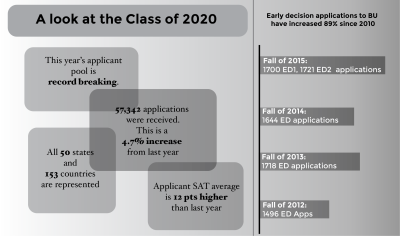
Boston University Admissions added a second early decision application deadline this school year to provide more options for students who are committed to BU’s binding application program, Kelly Walter, associate vice president and executive director of admissions, said.
The second deadline is Jan. 4, with a Feb. 15 notification date, which is three months after the Nov. 1 early decision deadline, according to the office’s website. This is the second time BU added an additional early decision deadline since 2009, Walter said.
Since 2010, the number of early decision applications BU received has increased by 89 percent, Walter said.
“We wanted to provide another pathway for students to apply to BU,” she said. “We wanted a binding program for students who knew BU was their first choice, but had truly missed that Nov. 1 deadline.”
In fall 2015, there were 1,700 early decision applications and 23 percent of the Class of 2020 had been accepted so far, BU spokesman Colin Riley said in an email. BU has also received 1,721 additional applications for the second early decision deadline.
One of the advantages of the new deadline is a chance for students to optimize their standardized testing scores for college admission, Walter said.
“Both the SAT and ACT are offered in November,” she said. “Some students would like to take one last opportunity to sit for those standardized exams prior to submitting an application. They’re just not ready for the first round of early decision.”
Walter said the early decision’s second deadline increases accessibility for a variety of students and gives students more time to prepare their applications. The additional deadline would also allow “first generation [students] or students from rural or urban school districts” more time to make informed decisions on their college choices, she added.
For the incoming Class of 2020, 12,877 of the total applicants are international students who represent 153 different countries, Walter said. This number shows how a second early decision deadline could increase international students’ ability to apply to BU before general admission, she added.
“International students are in completely different education systems and environments,” she said. “Often, the first round of ED is often too early for international students, and they are not able to get their applications together in time.”
The applicant pool of the incoming Class of 2020 was record-breaking in size and academic performance, boasting a total of 57,342 applications and a 4.7 percent increase from last year’s total.
“This is the largest number of freshman applications we have ever had in our history,” she said. “We are proud to see more and more students who are interested in BU and applying early.”
Walter also said the average SAT score among applicants was 12 points higher than those in previous years.
“[The increase in applicants’ average SAT score] is a reflection of the growing stature of the university,” she said. “What is equally important is that the academic profiles of students applying for admission is growing stronger.”
Several students said applicants should consider both benefits and disadvantages of early decision before submitting an application due to the high level of commitment expected.
Adam Deangelo, a freshman in the College of Communication, said early decision would be an appropriate option for students who are committed to a university because of the more generous acceptance rates.
“[Early decision] is an advantage for students,” he said. “I don’t think its an unfair advantage, [but] it’s just for students who are set on the school and are ready to commit sooner than normal students.”
Isabel Donohoe, a freshman in the College of General Studies, said early decision benefits applicants from waiting too long for a response but prohibits them from weighing other choices.
“I didn’t use early decision because I wasn’t ready to commit to a school so early,” she said. “I know ED means less worry, but you can’t change your mind [if you] don’t want to go to that school for some reason.”
Evan Armacost, a sophomore in the College of Arts and Sciences, said students should weigh the commitment of early decision according to the potential advantages of applying early.
“Early decision is good for the student so they don’t have to worry after November,” he said, “But you want to make sure you’re not jumping into anything you’re not sure about, because [early decision] is a serious commitment.”























































































































